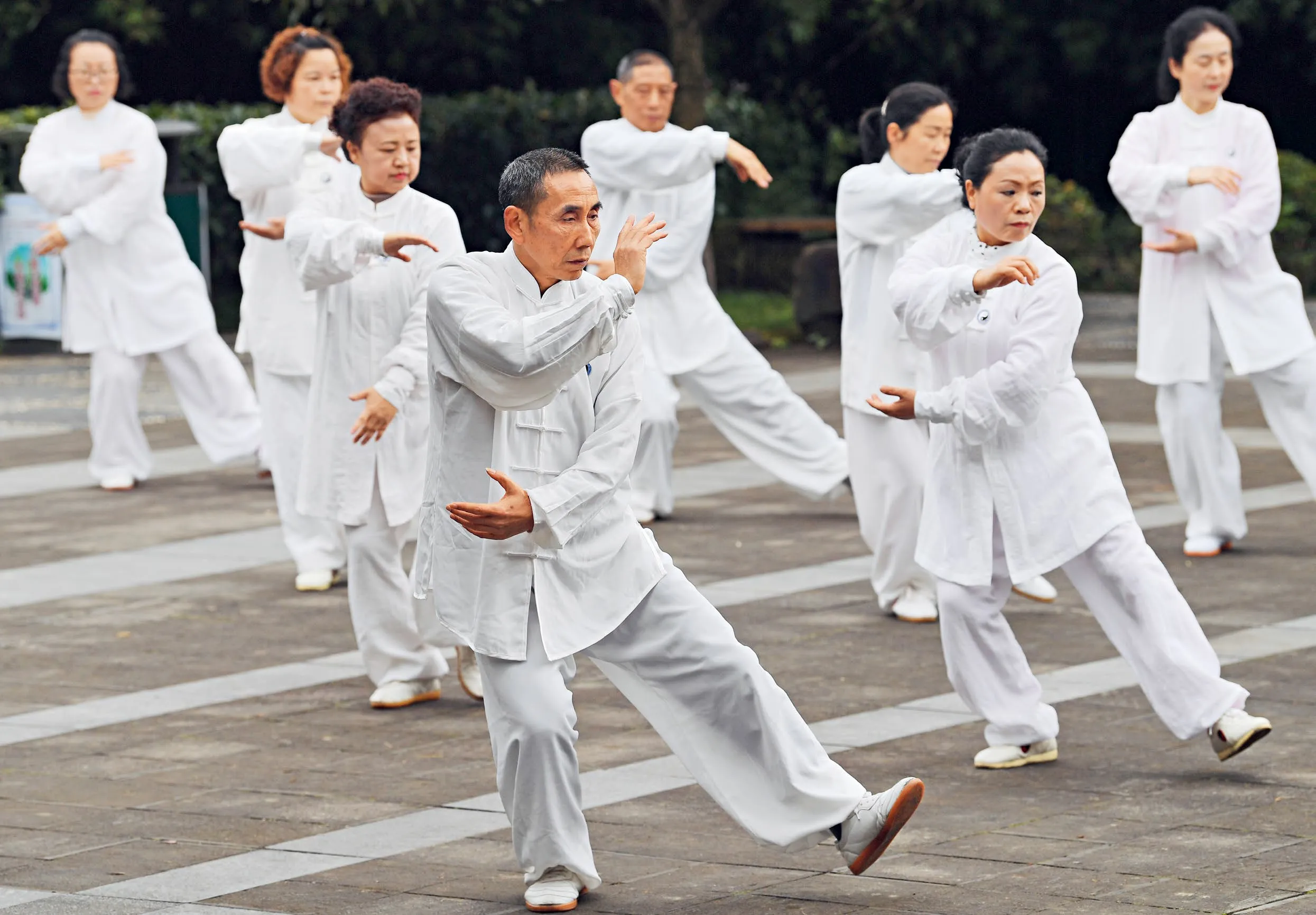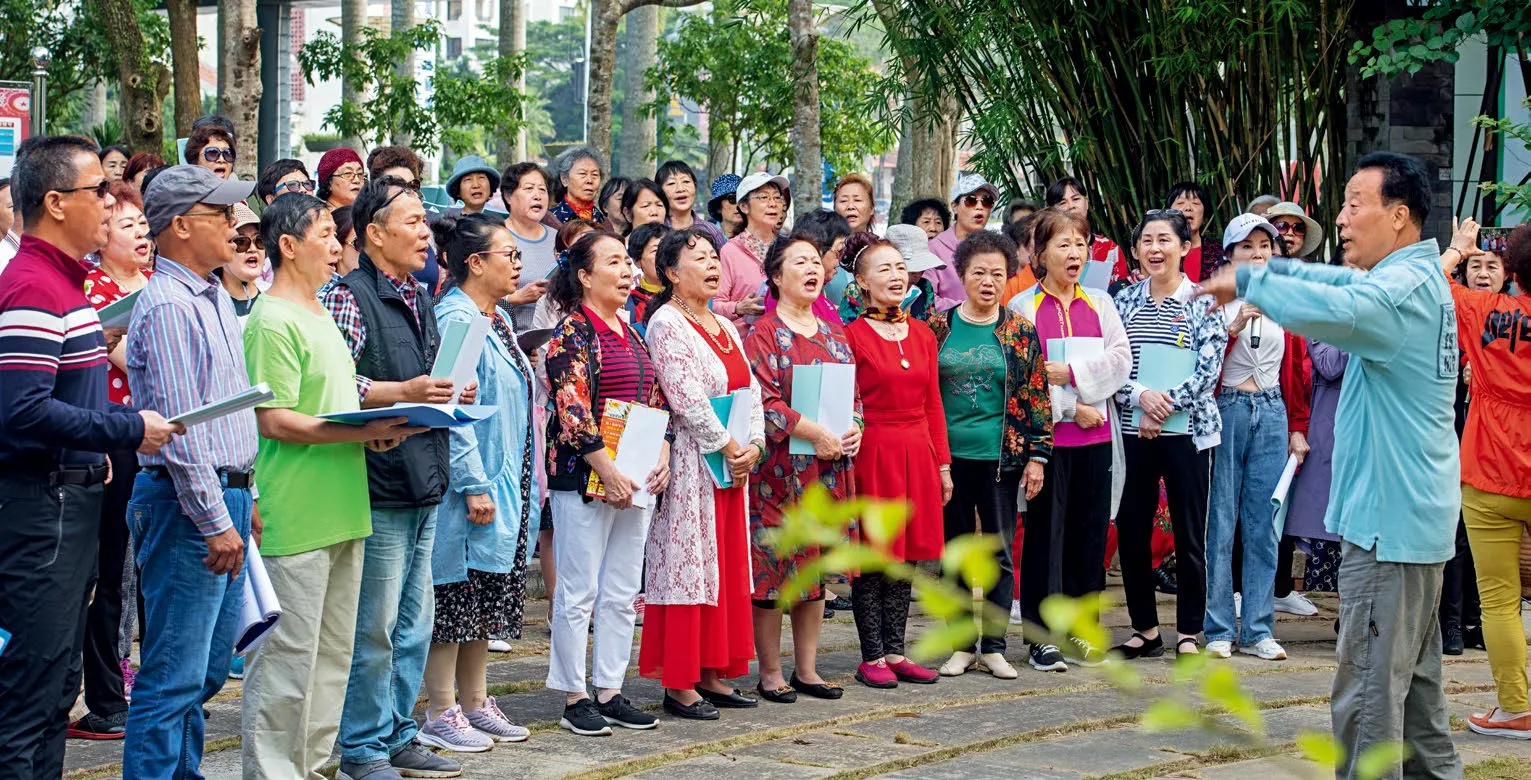Delayed Retirement:Pressure’s on Who?
By Qiu Hui
China is raising the retirement age very slowly to avoid public backlash

Seniors practice Tai Chi in a park in Fuling District of Chongqing Municipality on November 29, 2020. (VCG)
The State Council of the People’s Republic of China recently issued guidelines to promote the development of national undertakings for the aged and improve the elderly care service system during the 14th Five-Year Plan period (2021-2025). The document indicated that China would soon start nationwide pooling of basic pension funds and gradually increasing the retirement age. The policies on raising the statutory retirement age in a phased manner are set to be rolled out officially during the 14th Five-Year Plan period.
Phases
After the proposal of raising the retirement age was included in the 2020 Report on the Work of the Government, local governments started soliciting public opinion. In 2022, policies to gradually defer retirement will start rolling out in cities.
According to a document on measures related to basic enterprise pensions issued by the Department of Human Resources and Social Security of Jiangsu Province in January 2022, insured employees need to submit an application and acquire approval from the employer to defer retirement. The application is filed with the administrative department of human resources and social security. Requested extension time cannot be shorter than one year. The measures went into effect on March 1, 2022.
Jiangsu thus became China’s first province to test postponing retirement for enterprise employees.
In January 2022, the Human Resources and Social Security Department of Shandong Province issued a document on specific regulations for enterprise and public institutions to raise the retirement age for senior professionals, making Shandong the first province to implement the policies nationwide. However, professions qualifying for deferring retirement were restricted to “technical type of work,” and only those with subsenior or senior professional titles are allowed to voluntarily defer retirement by one to three years.
Dong Dengxin, director of the Institute of Financial Securities of Wuhan University, noted that the pilot efforts in several cities to postpone the retirement age are beta testing methods to roll out national policies. It would not take long for most Chinese cities to raise the retirement age according to a national action plan.
A national action plan to defer retirement age would make adjustments on the standards of statutory retirement age. Dong said that the efforts to raise the retirement age in a phased manner, as outlined in the guidelines to promote the development of national undertakings for the aged and improve the elderly care service system during the 14th Five-Year Plan period, would focus on detailed and elaborate measures to avoid negative public opinion towards a longer working career.

A group of retirees attends choir practice in a park in Qionghai City, Hainan Province, on November 25, 2021. (VCG)

“Flexible retirement regulations will allow people with health issues to retire at the normal time or even earlier,” said Dong. “But people who are still in perfect condition can choose to work if they want. Raising the retirement age can facilitate optimization of labor resources, increase the supply of wealth and, most importantly, relieve pressure on young people to pay for social insurance.”
Dong added that Jiangsu and Shandong provinces are relatively economically developed and have greater mobility of labor resources, making them more suitable for trial runs on raising the retirement age. Importantly, such measures tend to be more easily accepted in more developed cities.
Aging Population
China’s current policy on retirement was enacted in the 1950s when the average life expectancy was around 50 years. In the late 1970s, the State Council further clarified that the statutory retirement age for men, female office workers and female blue-collar workers was 60, 55 and 50 respectively.
With rapid socioeconomic development over the past decades, life expectancy has notably increased, and the aging population has become a pressing problem. According to the seventh national population census in 2020, China has 264 million people aged 60 years and above, accounting for 18.7 percent of its total population, and the population over the age of 65 is about 190 million, 13.5 percent of the total.
Many experts, including Dong, maintain that the retirement age in China is relatively low and varies for different occupations. Raising the statutory retirement age is essential for tackling many of the problems associated with the aging population.
Zheng Bingwen, director of the Research Center of World Social Security at the Chinese Academy of Social Sciences, has been calling to defer retirement age for many years. He has argued that the problem of the aging population will persist for a long time, and extending employment time is just one necessary measure to mitigate the negative impact of the aging population.
In June 2020, Zheng noted that the old age dependency ratio in the 14th Five-Year Plan period (2021-2025) would be 10 percent higher than in the last Five-Year Plan period. From 2021 to 2025, China will enter a stage where two people in the labor force pay the pension for one retired person.
Zheng stressed that it is imperative to raise the retirement age because “pressure on payment of basic pension insurance will incrementally grow.” Zheng believes that deferring retirement is the most effective and direct way to reduce the deficit and maintain a balance between income and expenditure.
Raising the retirement age slowly and gradually also aligns with the national strategy clarified in the 14th Five-Year Plan to respond to the aging population. The basic principles are slow and gradual steps, flexible measures, encouraging people to defer retirement, and respecting personal decisions in the context of the national regulations.
The retirement age will be raised in a phased manner.
Labor Market
The policy to defer retirement mainly affects employees who would legally retire at 60, 55 and 50 years old respectively.
“The retirement age will be raised in a phased manner, so it will only affect people retiring several years from now,” said Dong. The policy won’t apply to those now nearing retirement.
As early as November 2013, the proposal to study and make policies on gradually raising the retirement age was submitted at the third plenary session of the 18th Central Committee of the Communist Party of China. The Ministry of Human Resources and Social Security also included the proposal in its 13th Five-Year Plan issued in July 2016. Specific measures on how to defer retirement have undergone comprehensive discussion in industry and academia.
Some fear that keeping more of the senior labor force around longer will make things harder for young job seekers. Dong commented that raising the retirement age does not directly affect young people’s employment. Since the birth rate has been decreasing in recent years and the labor force has already registered negative growth, new entries into the labor force are relatively few. Dong predicted a labor shortage in the near future.
“Meanwhile, China is undergoing industrial and economic transformation, so new jobs are created by new business models, new technologies, and new industries,” said Dong. “If it’s a brandnew job, you don’t need to wait for a position left by a retiree.”
Dong added that mechanization and artificial intelligence have greatly lowered labor intensity, relieving work pressure and providing material and technological support for veteran workers to extend their careers. “People of any age with health issues will be exempt from the new policy and can retire on the previous schedule or earlier,” he said.
In addition, raising the retirement age will change ideas on sending people out the door just because of age. It will increase the supply of senior workers and hedge against an impending shortage of labor in industries such as senior care and community services. The policy of raising the retirement age will greatly facilitate an improvement in the structure of labor forces, an economic transformation, and industrial upgrading.
Sun Jie, vice dean of the School of Insurance and Economics at the University of International Business and Economics, called raising the retirement age a comprehensive and interlinked task. She said that it requires analysis of many aspects such as mandatory age limits for the payment of social insurance, flexible regulations for retirement age, statutory age to draw pensions and the pension replacement rate, as well as supporting regulations and public’s acceptance. The policy needs to mesh with the work force’s demands and satisfy public expectations so as to promote the growth of the economically active population and better coordinate the employment mechanism and the pension system.
“As China’s economic growth has embraced a new normal, development of cutting-edge technologies and high-quality economic development have significantly influenced labor demand,” said Sun. “The labor market has undergone profound changes, during which some work disappeared while new jobs emerged.
“In the short term, raising the retirement age will alleviate structural problems of employment, and in the long term, it will tackle insufficient supply of labor. China is accelerating high-quality economic development, so new technologies, new industries, and new business models are emerging quickly. In this context, economic growth will boost employment, and young people will continue to embrace promising job prospects.”

